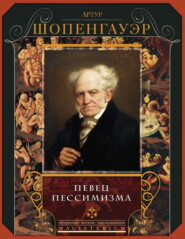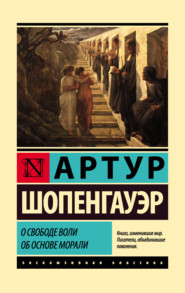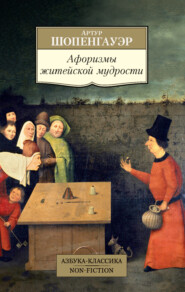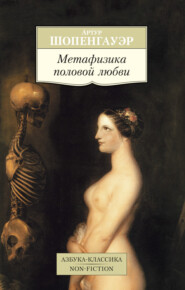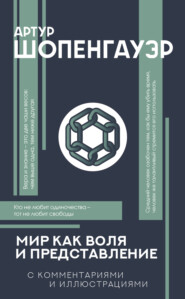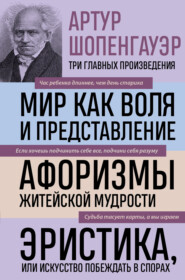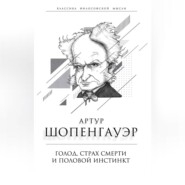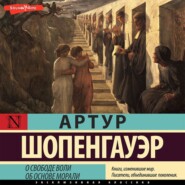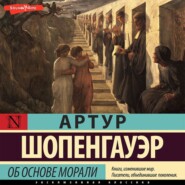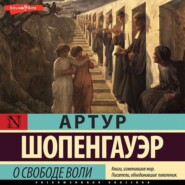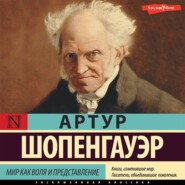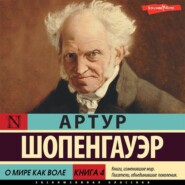По всем вопросам обращайтесь на: info@litportal.ru
(©) 2003-2024.
✖
The World as Will and Idea (Vol. 3 of 3)
Настройки чтения
Размер шрифта
Высота строк
Поля
Let me remark in passing that from this opposition of ποιησις and ἱστορια the origin, and also the peculiar significance, of the first word comes out with more than ordinary distinctness; it signifies that which is made, invented, in opposition to what is discovered.
25
This chapter is connected with § 52 of the first volume.
26
It would be a false objection that sculpture and painting are also merely in space; for their works are connected, not directly, but yet indirectly, with time, for they represent life, movement, action. And it would be just as false to say that poetry, as speech, belongs to time alone: this is also true only indirectly of the words; its matter is all existent, thus spatial.
27
This chapter is connected with § 54 of the first volume.
28
In gladiatoriis pugnis timidos et supplices, et, ut vivere liceat, obsecrantes etiam odisse solemus; fortes et animosos, et se acriter ipsos morti offerentes servare cupimus (Cic. pro Milone, c. 34).
29
The suspension of the animal functions is sleep, that of the organic functions is death.
30
There is only one present, and this is always: for it is the sole form of actual existence. One must attain to the insight that the past is not in itself different from the present, but only in our apprehension, which has time as its form, on account of which alone the present exhibits itself as different from the past. To assist this insight, imagine all the events and scenes of human life, bad and good, fortunate and unfortunate, pleasing and terrible, as they successively present themselves in the course of time and difference of places, in the most checkered multifariousness and variety, as at once and together, and always present in the Nunc stans, while it is only apparently that now this and now that is; then what the objectification of the will to live really means will be understood. Our pleasure also in genre painting depends principally upon the fact that it fixes the fleeting scenes of life. The dogma of metempsychosis has proceeded from the feeling of the truth which has just been expressed.
31
This posthumous essay is to be found in the “Essays on Suicide and the Immortality of the Soul” by the late David Hume, Basil, 1799, sold by James Decker. By this reprint at Bâle these two works of one of the greatest thinkers and writers of England were rescued from destruction, when in their own land, in consequence of the stupid and utterly contemptible bigotry which prevailed, they had been suppressed through the influence of a powerful and insolent priesthood, to the lasting shame of England. They are entirely passionless, coldly rational investigations of the two subjects named.
32
Death says: Thou art the product of an act which should not have been; therefore to expiate it thou must die.
33
Sancara, s. de theologumenis Vedanticorum, ed. F. H. H. Windischmann, p. 37; “Oupnekhat,” vol. i. p. 387 et p. 78; Colebrooke's “Miscellaneous Essays,” vol. i. p. 363.
34
The etymology of the word Nirvana is variously given. According to Colebrooke (“Transact. of the Royal Asiat. Soc.,” vol. i. p. 566) it comes from va, “to blow,” like the wind, and the prefixed negative nir, and thus signifies a calm, but as an adjective “extinguished.” Obry, also, Du Nirvana Indien, p. 3, says: “Nirvanam en sanscrit signifie à la lettre extinction, telle que celle d'un feu.” According to the “Asiatic Journal,” vol. xxiv. p. 735, the word is really Neravana, from nera, “without,” and vana, “life,” and the meaning would be annihilatio. In “Eastern Monachism,” by Spence Hardy, p. 295, Nirvana is derived from vana, “sinful desires,” with the negative nir. J. J. Schmidt, in his translation of the history of the Eastern Mongolians, says that the Sanscrit word Nirvana is translated into Mongolian by a phrase which signifies “departed from misery,” “escaped from misery.” According to the learned lectures of the same in the St. Petersburg Academy, Nirvana is the opposite of Sanfara, which is the world of constant re-birth, of longings and desires, of illusion of the senses and changing forms, of being born, growing old, becoming sick, and dying. In the Burmese language the word Nirvana, according to the analogy of other Sanscrit words, becomes transformed into Nieban, and is translated by “complete vanishing.” See Sangermano's “Description of the Burmese Empire,” translated by Tandy, Rome, 1833, § 27. In the first edition of 1819 I also wrote Nieban, because we then knew Buddhism only from meagre accounts of the Burmese.
35
“Disputatio de corporum habitudine, animæ, hujusque virium indice.” Harderov., 1789, § 9.
36
Lichtenberg says in his miscellaneous writings (Göttingen, 1801, vol. ii. p. 447): “In England it was proposed to castrate thieves. The proposal is not bad: the punishment is very severe; it makes persons contemptible, and yet leaves them still fit for trades; and if stealing is hereditary, in this way it is not propagated. Moreover, the courage ceases, and since the sexual passion so frequently leads to thefts, this cause would also disappear. The remark that women would so much the more eagerly restrain their husbands from stealing is roguish, for as things are at present they risk losing them altogether.”
37
I have not ventured to express myself distinctly here: the courteous reader must therefore translate the phrase into Aristophanic language.
38
The fuller discussion of this subject will be found in the “Parerga,” vol. ii. § 92 of the first edition (second edition, pp. 167-170).
39
[The appendix to this chapter was added only in the third edition of the German, and is meant to explain, in consistency with Schopenhauer's general principles, the wide prevalence of the practice of pederasty, among different nations and in different ages. It is omitted. —Trs.]
40
This chapter is connected with § 60 of the first volume.
41
This chapter is connected with §§ 56-59 of the first volume. Also chapters 11 and 12 of the second volume of the “Parerga and Paralipomena” should be compared with it.
42
All that we lay hold of resists us because it has its own will, which must be overcome.
43
This chapter is connected with §§ 55, 62, 67 of the first volume.
44
This chapter is connected with § 68 of the first volume. Chapter 14 of the second volume of the Parerga should also be compared with it.
45
If, on the contrary, asceticism is admitted, the list of the ultimate motives of human action, given in my prize essay on the foundation of morals, namely: (1) our own good, (2) the ill of others, and (3) the good of others, must be supplemented by a fourth, our own ill; which I merely mention here in passing in the interests of systematic consistency. In the essay referred to this fourth motive had to be passed over in silence, for the question asked was stated in the spirit of the philosophical ethics prevailing in Protestant Europe.
46
Cf. F. H. H. Windischmann's Sancara, sive de theologumenis Vedanticorum, pp. 116, 117, 121; and also Oupnekhat, vol. i. pp. 340, 356, 360.
47
Cf. Die beiden Grundprobleme der Ethik, p. 274 (second edition, p. 271).
48
If we keep in view the essential immanence of our knowledge and of all knowledge, which arises from the fact that it is a secondary thing which has only appeared for the ends of the will, it then becomes explicable to us that all mystics of all religions ultimately attain to a kind of ecstasy, in which all and every knowledge, with its whole fundamental form, object and subject, entirely ceases, and only in this sphere, which lies beyond all knowledge, do they claim to have reached their highest goal, for they have then attained to the sphere in which there is no longer any subject and object, and consequently no more knowledge, just because there is no more will, the service of which is the sole destiny of knowledge.
Now, whoever has comprehended this will no longer regard it as beyond all measure extravagant that Fakirs should sit down, and, contemplating the tip of their nose, seek to banish all thought and perception, and that in many passages of the Upanischads instructions are given to sink oneself, silently and inwardly pronouncing the mysterious Oum, in the depths of one's own being, where subject and object and all knowledge disappear.






